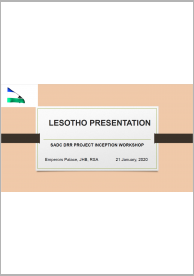
Lesotho presentation in the Strengthening Disaster Risk Reduction, Coordination, Planning and Policy Advisory Capacity of SADC Project Inception Workshop, held in Johannesburg, South Africa, 20-24 January 2020.
Disaster risk reduction and resilience publications, reports, research papers and case studies.
The following is a list of all conten labeled as "Documents & Publications"

Lesotho presentation in the Strengthening Disaster Risk Reduction, Coordination, Planning and Policy Advisory Capacity of SADC Project Inception Workshop, held in Johannesburg, South Africa, 20-24 January 2020.
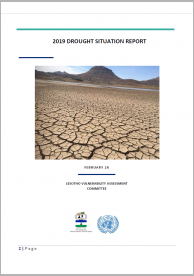
Lesotho experienced drought from the start of the winter season up to date. The results of which is felt across the whole country whereby most of the districts reported water shortages for both human and livestock consumption. Water levels in many water bodies and underground water have been deteriorating since 2012 and this has negative impacts on different sectors.

The main objective was to analyse food and nutrition security, and vulnerability of the population of Lesotho in 2019/2020 consumption year. Provide policy makers, government and other stakeholders with information for decision making and development programming.
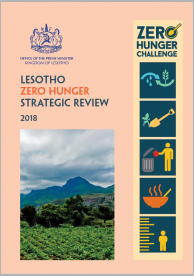
In order to address the challenges that inhibit the country’s potential to achieving zero hunger by 2030, the Government commissioned the Lesotho Zero Hunger Strategic Review (LZHSR) report.

This paper provides an overview of what climate change will mean to subsistence and smallholder farmers in Lesotho, and how the capacity for climate change adaptation in agriculture can be strengthened, focusing on selected areas of crops, livestock and forest-based livelihood systems, to stabilize and improve yields.
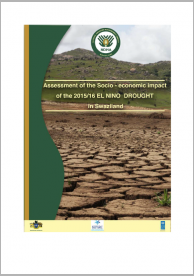
This report provides detailed findings of an investigation into the socioeconomic impacts of the 2015/16 El Niño drought in Swaziland. It records the direct and indirect effects of the drought on the economy of Swaziland and documents how it has affected households, businesses, and the environment.

The National Disaster Management Agency (NDMA) commissioned a Mid-Term Review (MTR) in November 2016 supported by the Swaziland UN Country Office focusing primarily on the period beginning from the National Emergency Response Mitigation and Adaptation Plan (NERMAP) launch (February 2016) to December 2016.
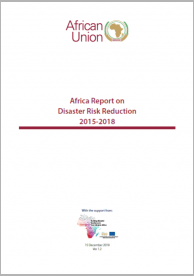
The aim of the Report is to comprehensively report on the implementation of the Programme of Action for the implementation of the Sendai Framework 2015-2030 and the Africa Strategy for Disaster Risk Reduction. This report focusses on all of the Member States of the Africa Union.
The objective is to use the outcome of the report to:
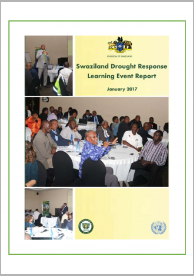
The 2015/2016 El Niño induced drought was the worst the country has experienced in over thirty-five years. In 2016, the National Emergency Response Mitigation and Adaptation Plan (NERMAP) 2016-2022 was developed and implemented with success during the response phase of the first year.
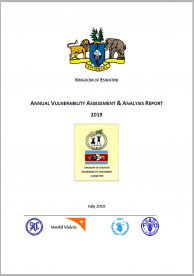
The 2019 Eswatini Vulnerability Assessment and Analysis was carried out between May and June 2019 with a view to provide information on the state of livelihoods and vulnerability with a particular emphasis on the rural areas of the country.